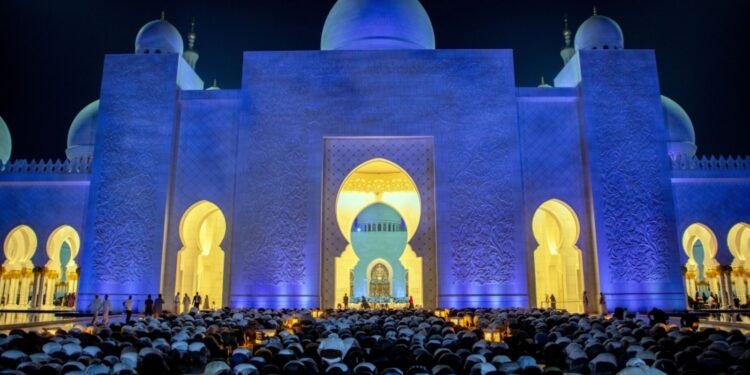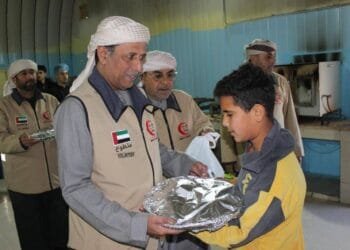Zayed University (ZU) students from the College of Businesss – Alyaa AlZubaidi, Meitha Almehairbi and Amna Alhammadi (all researchers) – are working on a market research project on Ramadan. They have conducted focus group discussions with senior citizens to research how different Ramadan is today compared to the times when they were at the age of today’s students, meaning 40-50 years ago. The researchers conducted focus group discussions with 18 Emirati women (aged 65+), with the support and help of Family Development Foundation in Abu Dhabi. The preliminary findings of the research were very compelling, and promising for publishing in an academic journal. The study revealed many interesting facts, including the impact of Modernisation; the effect of Consumerism, when spending more was considered trendy; and that the Year of Community was launched at the right time. Sustainability is not just about preserving the environment, but is also about preserving cultures and traditions, the researchers underline. Alyaa AlZubaidi is Senior, BSc Marketing and Entrepreneurship; Meitha Almehairbi, is Senior, BSc Marketing and Entrepreneurship; and Amna Alhammadi is Senior, BSc Marketing and Entrepreneurship. They were supervised by Dr. Nataša Slak, Associate Professor, Zayed University. The researchers speak to Gulf Today
Can you name some Ramadan traditions from the past you wish would make a comeback today?
Our research showed us that many people, seniors and children, want to see traditional practices come back, with a desire for more community-oriented practices and communal eating outdoors. Some respondents particularly recalled the suhoor waker (al-musaharat), the man who called to wake up people for the suhoor meal. Communal eating outdoors was also a tradition close to their hearts, because it allowed passersby to join a large table, with no one being left to eat alone. – Meitha Almehairbi.

How do you think modernisation and technology have reshaped Ramadan traditions, positively and negatively?
Modernisation has had an impact on all aspects of life, including Ramadan traditions, in the age of technology. While we have access to so many resources that help in preparing food, catering, and finding ingredients, some aspects of social life have been lost with modernisation. One of our respondents recalled that though it took long to prepare a meal in the kitchen because they had to use their bare hands, it was always worth the time and effort, since neighbours always gathered together. Now, they did not even know their neighbours. – Alyaa AlZubaidi.
In the context of the UAE’s ‘Year of Community’, how important are Ramadan’s social traditions?
The Year of Community definitely seems to have been launched at the right time. Our research found that Emirati seniors missed the times when Ramadan and Eid celebrations were more of a community event, and traditions were still strongly embraced. One of the ladies mentioned how important it was for parents to teach their children those traditions, while another spoke about how behaviours needed to match the importance of Ramadan, despite the generational changes. The UAE’s Year of Community initiative, especially when tied to Ramadan’s social traditions, are pivotal in reinforcing community ties. We believe that sustainability is about preserving cultures and traditions and leveraging the experiences of those who came before us. – Alyaa AlZubaidi.

Is the essence of Ramadan being observed differently now, or is it only being expressed differently?
Our research found that the essence of Ramadan remains intact, emphasising spirituality and community, though its expression has evolved due to modern lifestyles. Even though Islamic rituals are practiced by Muslims frequently around the year, Ramadan remains very different. The ladies we talked to described it as being observed with more intention – which we found very beautiful. – Amna Alhammadi.
Is the new generation of Emiratis losing touch with the traditional values of Ramadan, or is there a resurgence of interest in cultural roots?
There were mixed opinions on this. While some traditional practices have waned, there is a notable interest among youth in reconnecting with cultural roots, indicating a potential resurgence. – Meitha Almehairbi.
In what ways can youth take more responsibility in preserving and reviving Ramadan customs in the UAE?
First and foremost, the youth need to learn traditional practices from older generations. If they don’t learn and use those practices, they can’t transfer them to the future generations. The youth can actively participate in community events and utilise social media to share and celebrate these traditions, thus keeping them alive. – Amna Alhammadi.

How can young people be motivated to engage with cultural heritage meaningfully, not just during Ramadan, but year-round?
Engaging youth can be achieved through educational programmes that emphasise sustainability, so that people understand sustainability as part of community, not only as part of the environment. More so, we hope to see more community projects highlighting the tangible benefits of cultural heritage, as well as integrating them into modern social activities. – Amna Alhammadi.
Do you think enough is being done to document and revive cultural traditions, especially that of Ramadan, today? What are the gaps in recording them?
We believe that research like ours adds to the recording of Emirati traditions, especially if we publish the findings in an academic journal. While efforts are being made, there are gaps in documentation and revival of cultural traditions. More structured initiatives and educational programmes are needed to ensure that Emirati heritage remains alive for generations to come. – Alyaa AlZubaidi.









 United Arab Emirates Dirham Exchange Rate
United Arab Emirates Dirham Exchange Rate

